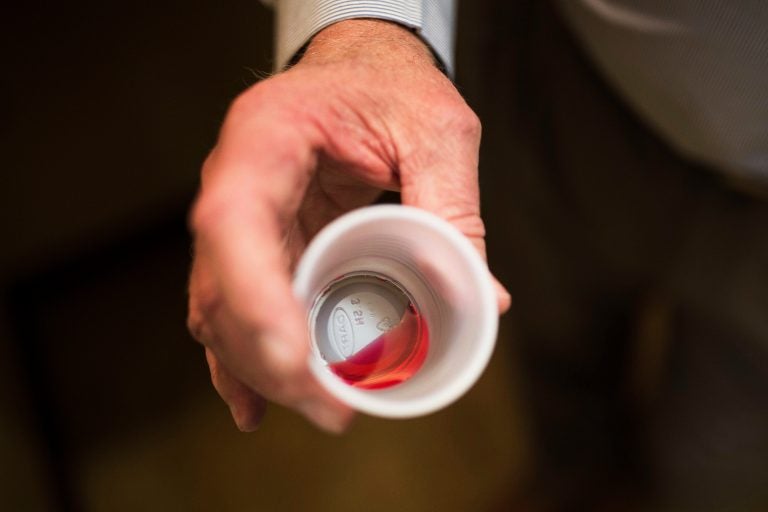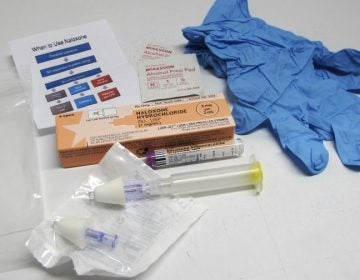Pew recommends Delaware increase access to opioid treatment
Pew Charitable Trusts offers suggestions for expanding medication-assisted treatment in Delaware, as well as making sure inmates have access to the addiction treatment.

In this March 7, 2017, file photo, the CEO of a methadone clinic holds a 35 mg liquid dose of methadone. (Kevin D. Liles/AP Photo, File)
Delaware’s opioid epidemic continues to plague the state.
Last year, more than 400 people died of overdoses — an increase of 55 over 2017. Of those deaths, 72 percent were due to fentanyl, a synthetic painkiller 50 times more deadly than heroin.
Despite those numbers, treatment options are failing to keep up with the demand. Not even half of Delawareans in need of treatment received it in 2014, according to the state Department of Justice.
Pew Charitable Trusts hopes to change that with eight recommendations on improving access to medication-assisted treatments, such as methadone.
The recommendations follow a months-long examination of Delaware’s opioid epidemic through interviews with more than 150 stakeholders. Delaware is one of two states to partner with Pew, a nonprofit and research policy organization, to improve behavioral health.
The organization has partnered with the state’s newly formed Behavioral Health Consortium, a group of health officials, law enforcement, state leaders and advocates.
“There will be no quick fix to this long-term problem, and what we’re attempting to do is set in place in Delaware a long-term sustainable health system that works for every Delawarean,” said Lt. Gov. Bethany Hall Long, who leads the consortium.
Recommendations include lowering restrictions on which providers can prescribe the medication-assisted treatment known as MAT and ensuring inmates can get all three MATs during and after incarceration.
“Delaware does have medically assisted treatment in corrections facilities, but we need to expand on that,” Hall Long said. “Keep in mind, tax dollars go up every time someone suffers brain hypoxia after an overdose. So it’s much better to have prevention and Narcan and things available and accessible than to wait until a person has overdosed or lost their job or lost their housing or is incarcerated.”
Another recommendation aims to ensure care teams are reimbursed for delivering health services. Delaware does not have enough providers to deliver MAT because of poor payment mechanisms for care coordination, Pew reports.
“When people have that coordination of care, they’re in the right level of care, they’re more successful, they’re in recovery, it helps prevent overdose. And some states use Medicaid dollars to fund this, which is very advantageous for states,” said Beth Connolly of Pew.
Hall Long, who said several of these initiatives can be done without funding, said she hopes the recommendations will lead to legislative efforts.
Mary Beth Cichocki is an advocate whose son Matthew died of an overdose in in 2015 at the age of 37. She said a contributing factor in her son’s death was that his insurance would not cover long-term care. Cichocki said she applauds the efforts to address the opioid crisis — but she’s disappointed the recommendations do not address long-term care.
“There’s scientific research out there that says 60 to 90 days is the necessary step to help someone. You have to get over the cravings, you need medication, you need mental health help,” she said. “You can’t just give someone methadone and tell them to go on their way. You haven’t addressed the root problem as to why they’re medicating.
“We really need to address the thing no one wants to address. It’s like the elephant in the room. We know we need it, but nobody really wants to talk about it. I know it’s a cost factor, but talk to me about the cost of losing my child.”
WHYY is your source for fact-based, in-depth journalism and information. As a nonprofit organization, we rely on financial support from readers like you. Please give today.




